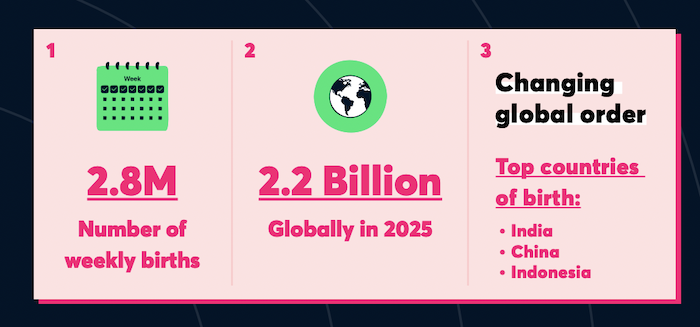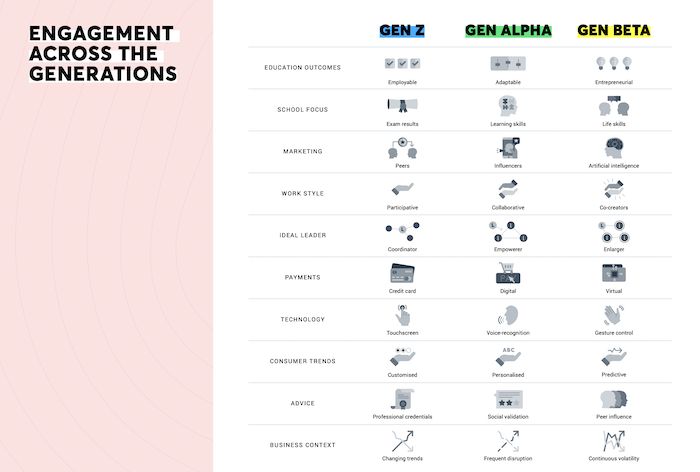
Who is Generation Alpha, and Why Are They Important to Marketers?
Every new generation brings new customs, behaviors, and cultural phenomena that shape the world as we know it.
Baby boomers brought significant economic influence.
Millennials taught us new ways of viewing our socio-political world.
Generation Z showed us what the intersection of technology and humanity looks like.
Now, we have Generation Alpha, a demographic of tech-savvy, racially diverse, and unapologetically influential children who will start entering adulthood at the end of the 2020s.
But, they’re children. They aren’t our buyers. Why should marketers care about them right now?
Studies have shown children under 12 can influence parental purchases of $130 to $670 billion a year. And, it won’t be long before they are the buyers.
It’s never too early to prepare. In fact, since the oldest kids in this generation are starting to hit middle school, we may even be cutting it close.
Let’s take a look at the climate shaping this upcoming generation and what we can expect from them in the future.
What Birth Years Are Considered Generation Alpha?
Generation Alpha covers those born between 2010 and 2024. Most of their parents are Millennials.
Every nine minutes, a new member of Generation Alpha is born in the United States. By 2025, this group will reach a worldwide population of more than two billion.

Generation Alpha Culture and the Future of Marketing
Although some Gen Alpha babies haven’t been born yet, there are a few things we can predict about them.
For starters, Generation Alpha will be the most technologically advanced generation to date, growing up with mobile devices, AI, social media, advanced healthcare, and robotics as parts of their everyday lives.
They will be digitally literate and adept multi-taskers as a result.
Gen Alpha also stands to be the most materially endowed generation of all time. This means they could end up being able to spend more on nonessentials than previous generations.
They also stand to be the most globally informed group so far, and they will have the longest life spans.
Generation Alpha Technology Trends
As Generation Alpha evolves, so will their familiar technology.
We’ve already seen the effects of exponential technological growth on current generations, and these effects will continue to grow.
It’s expected that AI and robotics will be completely integrated into modern life by 2025. We can also expect machine learning, natural language processing, and smart devices to change, improve, and further connect us in the coming years.
Gen Alpha may find themselves interacting with robots just as frequently as with humans.
For marketers, this means speaking to an astute audience that may know the ideal product better than we do.
Similarly, we can expect Gen Alpha to reject traditional forms of marketing, much like their Millennial parents did not long ago. An increasing interest in personalization, humanized messaging, and social shopping should be assumed.
Generation Alpha Education Trends
Generation Alpha stands to be the most educated generation to date.
Access to education is at an all-time high, with most countries reporting twelve or more years of schooling for every individual citizen.
According to UNESCO, each additional year of education increases a person’s earnings by roughly 10%.
With improving digital resources and the increasing availability of technology, Gen Alpha will have better access to long-term education than any previous generation.
That said, the way they view education will likely be different. There may be less emphasis on formal degrees and, instead, a focus on skills.
The Eduniversal Evaluation Agency (EEA) put it this way:
In an age where every other tech CEO and startup founder dropped out of college and now rakes in millions, it’s hard to argue that moving forward, a degree will remain an absolute prerequisite for success.
In addition to these trends, we’ll see the continuation of highly personalized instructional content.
A generation used to instant access to information is unlikely to succeed in three-hour-long lectures. Instead, we can expect an increase in online learning, especially tutorials, which will further the technological proficiency of Gen Alpha.
Generation Alpha Social Media Trends
Young people are increasingly drawn to social media. With the introduction of social media e-commerce, social media has become one of the most essential tools for marketers in the modern age.
One survey found 49% of 16- to 24-year-olds look to social media for purchase inspiration. This is higher than older generations—their parents may only do this 20% of the time, for instance.
As more Gen Alpha kids grow up immersed in social media, we can predict social media usage will become an increasingly inextricable part of their lives.
Gen Alpha already uses social media differently than their parents. They’re less likely to be on Facebook or Twitter, favoring Instagram and TikTok. Brands that stay on top of the newest technology stand to see greater success with this burgeoning generation.

Generation Alpha Data Sharing Trends
Gen Alpha may be warier of providing or allowing access to their data to social media giants, search engines, ad agencies, and so on. We’re already seeing this trend today, with more and more countries instituting data privacy laws such as the GDPR.
By the time Generation Alpha reaches maturity, they’ll probably have a deep understanding of their data and how it’s used. This could lead to higher levels of criticism and questioning when consenting to data usage—they might read that fine print.
Companies looking to leverage consumer data should consider what they give back in return. Often, an equal exchange is enough to encourage consumer consent.
Brands doing this incorrectly risk losing their rising audience.
Generation Alpha Healthcare Advancements
Much like their millennial parents, Gen Alpha will likely spend more time finding medical information online. Self-service and convenience will continue to be driving factors for Gen Alpha’s healthcare.
In addition, younger generations are increasingly aware of mental health and are more likely to seek help for challenges with theirs when needed. They’ll likely expect their workplaces to offer mental health coverage and resources.
On the brand side, this means staying compassionate and aware of mental health can greatly improve overall brand integrity.
The Bell Let’s Talk movement is a strong example of a brand doing this right.

Generation Alpha Media Literacy Trends
Gen Alpha will have the best media literacy of any generation. They’ll be able to separate fact from fiction and more likely to identify conspiracy theories or fake news circulating on the internet.
For marketers, this means speaking to a well-informed audience that isn’t likely to be persuaded by traditional marketing tactics.
It also means engaging Gen Alpha in the arenas they prefer. Podcasting, video content, and gamification will become increasingly important when delivering information.
Additionally, personalization in marketing will continue to grow in popularity. For Gen Alpha, it won’t be enough to simply push a sale. Marketers will need to connect with this generation in an ongoing way.
Generation Alpha Diversity Trends
The US is becoming more diverse, and younger generations are increasingly aware and accepting of challenges based on race, religion, disability, sexual orientation, and gender identity.
Gen Alpha’s patience for inequality will almost surely continue to decrease as they grow up.
Children of this generation are unlikely to work for a company that doesn’t reflect their values. In the same way, they won’t buy from brands that go against what they believe in.
Brands championing diversity and social issues while embracing widespread change will flourish. Brands that don’t evolve will be left behind.
Generation Alpha Economic Trends
Generation Alpha first came into being during an economically tumultuous time as the world recovered from the Great Recession.
They’ve gone through some pretty interesting ups and downs since then, and significant political and social issues will continue to affect their economic standing.
We can be reasonably sure that they’ll be largely invested in the experience economy, including live entertainment, amusement parks, spectator sports, and tours.
This economy has largely been fueled by social media and technology, as people share the fun they’re having and others want to have adventures as well.
Additionally, Gen Alpha is predicted to be the longest-living generation of humans so far. Because of this, they’ll likely stay in the workforce longer, meaning more money over their working years.
As marketers, we need to plan for all of this. Our consumers face a bit of a question mark in terms of the economy. But, we know what they want—experiences—and that they’ll be educated and in the workforce for a long time. Catering to a changing climate and meeting their needs and desires throughout their lifetimes is essential.
Conclusion
Generation Alpha represents a fascinating, technologically advanced evolution of the human species.
People in this generation are digital natives growing up with smartphones, social media, and AI. They’re entering a genuinely advanced world where automation and innovation rule.
Additionally, their purchasing influence is already present, and they’re influencing their parents buying decisions even now.
Marketers who pay attention to this generation now will be better prepared to out-market big competitors in the coming years.
We can expect to see a well-educated, digitally fluent, socially-conscious generation. We need to keep up.
What predictions do you have for Gen Alpha?
The post Who is Generation Alpha, and Why Are They Important to Marketers? appeared first on Neil Patel.
